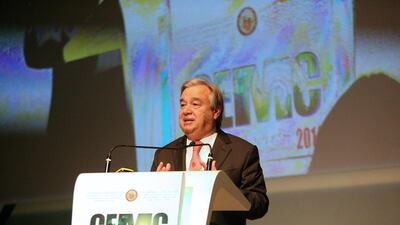ABU DHABI // With the number of global conflicts rising and a world that is growing increasingly dangerous and unpredictable, the United Nations has urged countries to be more prepared to respond to crises.
Antonio Guterres, the UN High Commissioner for Refugees, said the multiplying conflicts had become increasingly more difficult to address while the capabilities of nations to solve them have become more limited.
“Preparedness and response is something we badly need in today’s world – a world that is dangerous and unpredictable,” he said. “We don’t know where the next crisis will be and unpredictability has become the name of the game.”
He said the number of new conflicts had multiplied in recent years, in countries including Mali, Cote d’Ivoire and Libya, while old conflicts, in Afghanistan and the Republic of Congo, remained.
“Today, we no longer live in a unipolar world,” he said. “We live in a kind of chaotic world, there’s no global governance system and power relations became unclear. There are very limited capabilities for nations to solve crises, like in Syria, and the capability to address the needs of people becomes more difficult.”
In the past 35 years, the Arab region has faced 272 crises that have led to the death of more than 100,000 people.
“These challenges or responsibility of facing them require readiness to deal with all the phases of emergencies and ensure their competent management and full recovery,” said Dr Nabil Elaraby, the Arab League’s secretary general. “This is why all experts and specialists focus on resilience and the capability of facing challenges.”
Climate change, food and water security, and urbanisation have become more interlinked.
“They create conditions for us to create a multiplication of disasters with more frequent and more dramatic consequences, like drought, which occurs every two years now,” Mr Guterres said. “Resources and capacities are not growing as far as the needs that we witness in today’s world, so it’s important to have preparedness and response.”
Dr Elaraby said the nature of some crises and disasters would require a high level of preparedness at all levels in the country.
“This would require a change in mentality in the way of dealing with emergencies and crises,” he said. “It’s always better to be well-prepared rather than facing the emergency or crisis when it happens.”
He said it had become one of the most important and urgent topics in the region.
“Almost every country is affected by disasters, emergencies and crises, regardless of their advanced capabilities. Response to such incidents requires an advanced infrastructure and specific response plans, which need constant updates amid the unexpected and continuous crises in some countries.”
Mr Guterres said partnership was key.
“As an organisation, we have 2,400 people working in and around Syria,” he said. “We’ve been able to mobilise almost US$1 billion (Dh3,67bn) of donations to support Syrian refugees last year and help 4.5 million people. Every single day, 130,000 relief items were moved, so the whole year represents a massive effort.”
More than seven million Syrians are displaced.
“Nowadays, crises are longer, they go on and on, seeming never to end,” he said. “Our objective is to be able to mobilise the people and equipment necessary to support 600,000 displaced in 72 hours, wherever that displacement takes place.”
He thanked Sheikha Fatima bint Mubarak, mother of the nation, and Sheikha Jawaher bint Mohammed Al Qasimi, the wife of Sharjah’s ruler, for their contributions.
“Nobody can do it alone, we need to do it together,” he said. “Partnership is essential for success, with the government, civil society and international organisations. This is particularly true in the UAE and the Gulf.
“It is the devotion deeply rooted in the best values of Islamic tradition and law, and the devotion of personalities like these that give us strength and courage to go on against all odds preparing ourselves and responding to dramatic crises that make more and more people suffer in today’s world.”
cmalek@thenational.ae

